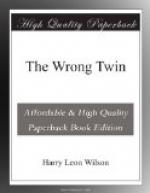Later Herman beamed less brightly as he recounted tales of German prowess. He came to exhibit a sort of indignant pity for the Fatherland, into whose way so many obstacles were being inopportunely thrown. He compared Germany to a wounded deer that ravenous dogs were seeking to bring down, but his predictions of her ultimate victory were not less confident. Minna Vielhaber wept back of the bar at Herman’s affecting picture of the stricken deer with the arrow in her flank, and would be comforted only when he brought the war to a proper close.
It was at this time that Winona wrote in her journal: “General Sherman said that war is the bad place. He knew.”
It was also at this time that a certain phrase from a high source briefly engaged the notice of Sharon Whipple.
“Guinea pigs,” said he, “are also too proud to fight, but they ain’t ever won the public respect on that account. They get treated accordingly.”
It was after this that Sharon was heard ominously to wish that he were thirty or forty years younger. And it was after this that Winona became active as a promoter of bazaars for ravaged Belgium and a pacifist whose watchword was “Resist not evil!” She wrote again in her journal: “If only someone would reason calmly with them!” She presently became radiant with hope, for a whole boatload of earnest souls went over to reason calmly with the combatants.
But the light she had seen proved deceiving. The earnest souls went forward, but for some cause, never fully revealed to Winona, they had been unable to reason calmly with those whose mad behaviour they had meant to correct. It was said that they had been unable to reason calmly even among themselves. It was merely a mark of Winona’s earnestness that she felt things might have gone differently had the personnel of this valiant embassy been enlarged to include herself. Meantime, war was becoming more and more the bad place, just as General Sherman had said. She had little thought now for silk stockings or other abominations of the frivolous, for her own country seemed on the very verge of committing a frightful error.
Some time had elapsed since Wilbur Cowan definitely knew that he would never go to war because of the mother of Lyman Teaford’s infant son. He began to believe, however, that he would relish a bit of fighting for its own sake. Winona reasoned with him as she would have reasoned with certain high personages on the other side of the water, and perhaps with as little success. He replied cryptically that he was an out-and-out phagocyte, and getting more so every time he read a newspaper. Winona winced at the term—it seemed to carry sinister implications. Where did the boy hear such words?




